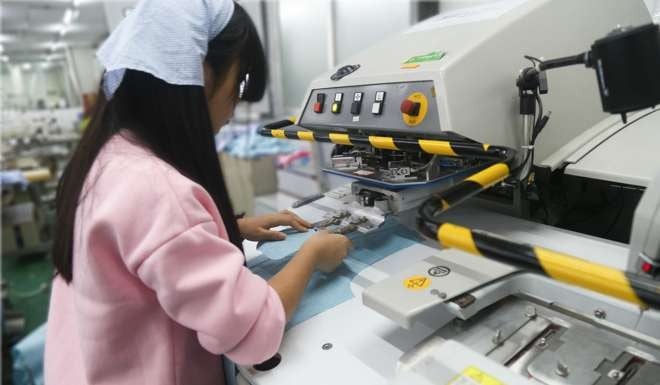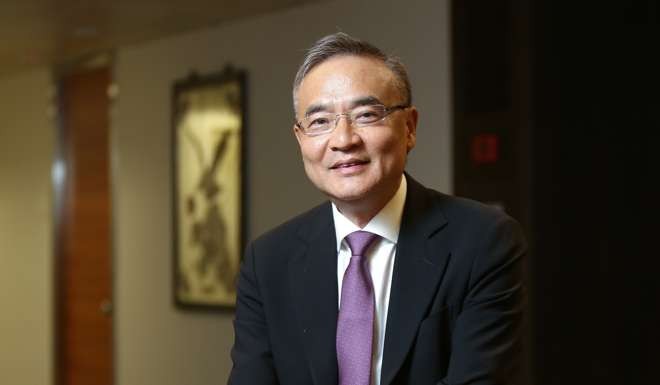
100m shirts and counting: Textile maker Esquel embraces technology to cut costs and protect the environment
World’s largest shirt maker invests 2 billion yuan in new plant featuring robotics and water treatment facilities to help cut costs and protect natural beauty

How does a business produce 100 million shirts a year without having to worry about rising costs? For Hong Kong-based Esquel Group, the world’s largest woven shirt maker with 56,000 employees, the answer is automation and environmentally friendly production processes that enhance productivity.
Esquel has invested 2 billion yuan (HK$2.34 billion) in a new factory in Jiumeiqiao, Guilin, where modern equipment is being used to reduce the cost of making clothing and shirts. The company even encourages tourists to visit the production plant to see how shirts are made, according to John Cheh, vice-chairman and chief executive of Esquel.
The first phase of the project will be completed by mid-2017, creating jobs for more than 2,000 workers.
The company’s expansion plan in mainland China stands in contrast with many other textile manufacturers, which have shifted to Cambodia or Bangladesh for the cheaper labour and to avoid increasingly tougher environmental protection measures in China.
“We don’t believe in competing with cheap labour as we think mainland China is still a good place for textile manufacturing companies. The country has a lot of talented workers who are very productive and skilful. There are also a lot of high-quality supplies of raw materials such as cotton and silk for our production needs,” Cheh told the South China Morning Post.
“This is why we decided to keep our core textile production lines in many mainland cities and invest in a new production plant in Guilin.”
Esquel, headquartered in Hong Kong, was founded by local textile tycoon Yang Yuanloong in 1978 and is now chaired by his daughter Marjorie Yang.

Last year, Esquel had annual revenues of US$1.4 billion, ranking it one of the largest textile makers.
It also has operations in some Asian countries such as Vietnam and Malaysia, but Cheh said this was due to historical reasons. Before the worldwide textile quota system was abolished in 2005, the company needed to use the quota from these markets to export products to developed markets like the US.
The expansion project in Guilin is located in an area called Jiumeiqiao, which literally means “Nine Beauty Bridge”. The project’s aim is to create an “industrial tourism ecological park” with textile production plants for 2,500 workers, as well as food and catering services and even facilities for tourists wanting to visit the production plants after they have taken in the beautiful scenery of Guilin.
The company, like many Hong Kong manufacturers, entered the mainland market in the 1980s when China opened up for foreign production and provided cheap labour and land.
However, mainland workers can no longer be considered cheap, given that the minimum pay now stands at 1,000 yuan per month, 50 per cent higher than Indonesia and Vietnam and about four times more than Bangladesh.
Esquel’s mainland workers are paid about 4,000 yuan a month on average, well above the minimum wage in China, but Cheh said they offered value for money.
“These workers earn much more than the minimum wage because they are very productive and they can earn more by achieving certain production volumes. If we move to a cheaper labour centre such as some African countries, we may pay less money on the surface but in fact the productivity of the workers there may not be as high as those on the mainland,” he said.
Cheh said the company was willing to invest in robots and other automated machines to help improve productivity but stressed that this would not replace the jobs of workers.
“We still need workers to operate the machines but the robots and other automation machines allow them to work faster and enhance their productivity,” he said.
Cheh also said it was more environmentally friendly for Esquel’s factories to be based in the mainland or other Asian markets because it used cotton grown in Xinjiang, which cut cost and saved time to transport the raw materials to the factories.
These workers earn much more than the minimum wage because they are very productive
“If we move our production plants to African countries, we would need to transport all raw materials from China to Africa, which would involve transportation time and cost. The carbon emissions from the transportation process are also against our mission of making sure our production process is environmentally friendly,” he said.
The company is a keen promotor of green business practices. For the past three years, it has hosted the annual Integral Conversation Forum in Guilin, attended by hundreds of industry experts and other professionals, who discuss how mainland Chinese companies can develop a business model that makes money while at the same time protecting the environment.
Rapid economic growth over the past three decades has seen China become the world’s second-largest economy but the country also paid the price with a lot of pollution problem that harmed people’s health. Beijing, which presented blue skies for the world to see during the 2008 Olympics and the 2014 Apec summit, now regularly tops the list of global cities with chronic air pollution.
Beijing and the regional governments in recent years have promoted the green approach to encourage companies to improve their facilities in order to save water and energy and reduce carbon emissions. Esquel’s environmentally friendly factories and its green efforts have been supported by the provincial government.
Speaking at the Integral Conversation Forum in November, Guilin deputy mayor Fan Xinhong said the forum’s mission to promote sustainable development was in line with Guilin’s green development agenda.
Cheh said Esquel’s project in Guilin fit the green agenda in that it invested in machines that used less energy while it would commit to zero discharge of waste water to prevent any spoiling of the natural beauty of Guilin, a city known for having one of the most scenic locations in China.
The textile maker invested 60 million yuan to install an advanced water treatment plant from the US to ensure the dyes and other production processes do not pollute the surrounding area.
“It would be a crime to spoil the natural beauty of Guilin. I can drink the water after it is filtered from this water treatment facility,” Cheh said.
“It is not just about social responsibility, it is also about profitability. The environmentally friendly production facilities allow us to save energy, water and chemicals, which help cut operation costs.”

Over a 10-year period, the company’s water usage for production was reduced by 66 per cent while it now uses 45 per cent less energy, which both have helped reduce cost.
Charles Yonts, head of sustainable research at CLSA, said in a recent report that environmental protection and governance efforts were an important factor taken into account when fund managers made investment decisions in companies.
“CLSA analysis shows that companies that achieve higher [environmental, social and governance] scores perform better on earnings revision and payout while exhibiting better free-cash-flow quality and lower balance-sheet risk. One could conclude that over time these companies would perform better,” Yonts said.
David Smith, head of corporate governance at Aberdeen Asset Management, said companies that took their social responsibility seriously tended to perform better. “Companies should pay attention to their reputational risks if their products cause pollution problems,” he said.

